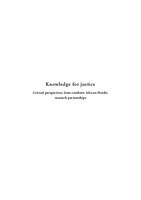Knowledge for Justice
Critical Perspectives from Southern African-Nordic Research Partnerships
| dc.contributor.editor | Halvorsen, Tor | |
| dc.contributor.editor | Evans, Henri-Count | |
| dc.contributor.editor | Penderis, Sharon | |
| dc.date.accessioned | 2018-12-12 12:09:23 | |
| dc.date.accessioned | 2020-04-01T12:27:35Z | |
| dc.date.available | 2020-04-01T12:27:35Z | |
| dc.date.issued | 2017 | |
| dc.identifier | 1000517 | |
| dc.identifier | OCN: 1076754981 | en_US |
| dc.identifier.uri | http://library.oapen.org/handle/20.500.12657/29419 | |
| dc.description.abstract | With the adoption of the United Nations Sustainable Development Goals (SDGs) and the Paris Agreement, the purpose of development is being redefined in both social and environmental terms. Despite pushback from conservative forces, change is accelerating in many sectors. To drive this transformation in ways that bring about social, environmental and economic justice at a local, national, regional and global levels, new knowledge and strong cross-regional networks capable of foregrounding different realities, needs and agendas will be essential. In fact, the power of knowledge matters today in ways that humanity has probably never experienced before, placing an emphasis on the roles of research, academics and universities. In this collection, an international diverse collection of scholars from the southern African and Nordic regions critically review the SDGs in relation to their own areas of expertise, while placing the process of knowledge production in the spotlight. In Part I, the contributors provide a sober assessment of the obstacles that neo-liberal hegemony presents to substantive transformation. In Part Two, lessons learned from North–South research collaborations and academic exchanges are assessed in terms of their potential to offer real alternatives. In Part III, a set of case studies supply clear and nuanced analyses of the scale of the challenges faced in ensuring that no one is left behind. This accessible and absorbing collection will be of interest to anyone interested in North–South research networks and in the contemporary debates on the role of knowledge production. The Southern African–Nordic Centre (SANORD) is a network of higher education institutions that stretches across Denmark, Finland, Iceland, Norway, Sweden, Botswana, Namibia, Malawi, South Africa, Zambia and Zimbabwe. Universities in the southern African and Nordic regions that are not yet members are encouraged to join. | |
| dc.language | English | |
| dc.subject.classification | thema EDItEUR::J Society and Social Sciences | en_US |
| dc.subject.other | knowledge | |
| dc.subject.other | SDGs | |
| dc.subject.other | networks | |
| dc.subject.other | research collaboration | |
| dc.subject.other | Higher education | |
| dc.subject.other | Neoliberalism | |
| dc.subject.other | Rand Water | |
| dc.subject.other | South Africa | |
| dc.subject.other | Sustainable Development Goals | |
| dc.subject.other | Sweden | |
| dc.title | Knowledge for Justice | |
| dc.title.alternative | Critical Perspectives from Southern African-Nordic Research Partnerships | |
| dc.type | book | |
| oapen.identifier.doi | 10.5281/zenodo.1086409 | |
| oapen.relation.isPublishedBy | 69707d01-8e78-4a41-abff-fccf8fb5f4a5 | |
| oapen.collection | ScholarLed | |
| oapen.pages | 248 | |
| oapen.remark.public | Relevant Wikipedia pages: Higher education - https://en.wikipedia.org/wiki/Higher_education; Neoliberalism - https://en.wikipedia.org/wiki/Neoliberalism; Rand Water - https://en.wikipedia.org/wiki/Rand_Water; South Africa - https://en.wikipedia.org/wiki/South_Africa; Sustainable Development Goals - https://en.wikipedia.org/wiki/Sustainable_Development_Goals; Sweden - https://en.wikipedia.org/wiki/Sweden | |
| oapen.identifier.ocn | 1076754981 |

